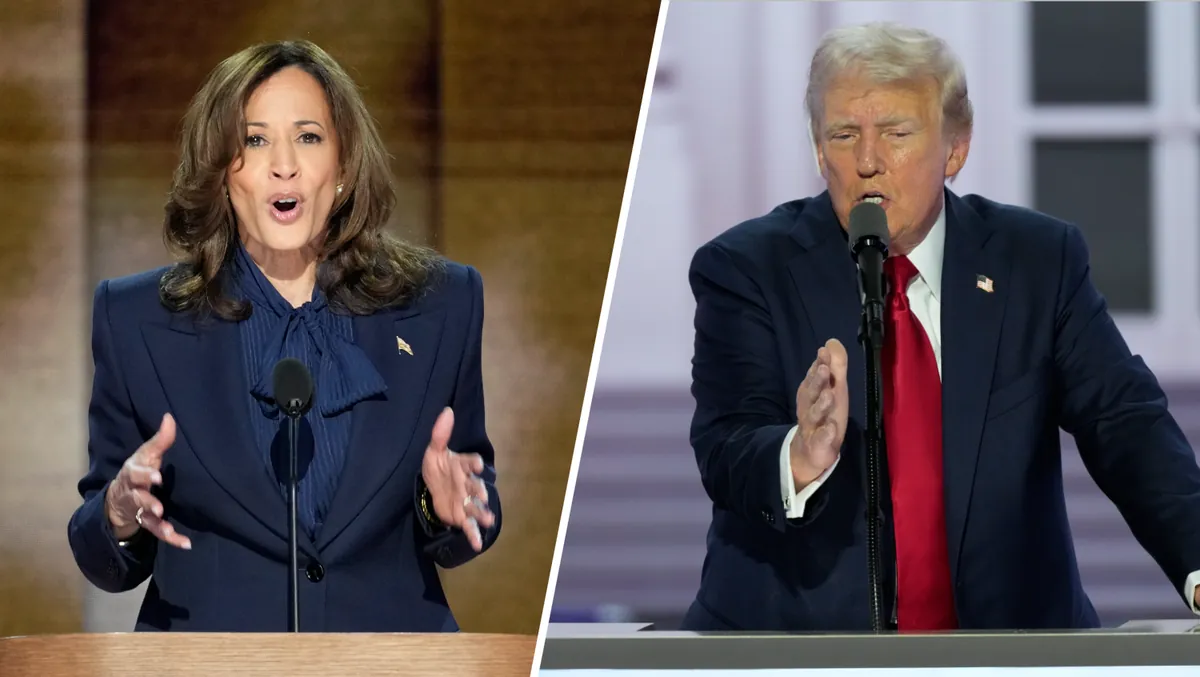Harris and Trump Blur Party Lines in Crucial Pennsylvania Battleground
As the 2024 election approaches, Harris and Trump adopt unconventional strategies to broaden their appeal in Pennsylvania. Both candidates focus on key issues like China policy and transition planning.

In the final stretch of the 2024 presidential race, Kamala Harris and Donald Trump are challenging traditional party boundaries to expand their voter base. This strategic shift is particularly evident in Pennsylvania, a crucial swing state that both candidates are targeting in the coming days.
Donald Trump is scheduled to visit Pennsylvania on September 23, 2024, focusing on plans to reduce U.S. dependence on China and protect American farmers. This event, organized by the Protecting America Initiative, will be held near Pittsburgh and led by Richard Grenell, Trump's former acting Director of National Intelligence. The initiative aims to address concerns about foreign ownership of U.S. farmland, a topic that has gained attention in recent years.

Kamala Harris, meanwhile, is set to visit Pennsylvania on September 25, 2024. Her campaign has recently reached an agreement with the General Services Administration (GSA) for pre-election transition support, a standard procedure established by the Presidential Transition Act of 1963. This agreement, signed on September 19, 2024, covers IT, record-keeping, and ethics policies in preparation for a potential Harris presidency.
The outcome of this election may hinge on the candidates' ability to attract voters outside their traditional base. Trump is courting conservative, white working-class voters, while Harris aims to retain the Democratic base of African Americans, Latinos, young people, and labor union members.
Both candidates are adopting positions that might have once been considered unorthodox for their respective parties. This shift reflects the evolving nature of U.S. politics and the increasing importance of swing states like Pennsylvania, a concept that gained prominence in American elections as far back as 1888.
The campaign strategies employed by Harris and Trump also highlight the complex relationship between the U.S. and China, particularly in areas such as agriculture and trade. Since 2018, the U.S. has imposed various tariffs on Chinese goods, escalating trade tensions between the world's two largest economies.
As the January 20, 2025 transition date approaches, government agencies are preparing detailed briefings for the eventual winner's team. This process, overseen by the White House Transition Coordinating Committee, ensures a smooth transfer of power, regardless of the election outcome.
In a separate development, law enforcement officials have revealed details about an apparent assassination attempt on Donald Trump. The suspect, identified as 58-year-old Ryan Wesley Routh, allegedly left a note indicating his intention to kill the former president. This incident underscores the ongoing security challenges faced by political figures and the crucial role of the Secret Service, an agency originally created in 1865 to combat currency counterfeiting.
As the campaign intensifies, both Harris and Trump will need to navigate the complex political landscape of Pennsylvania, a state that became the second to ratify the Constitution on December 12, 1787. Their success in this battleground state could prove decisive in determining the next occupant of the White House.
"The agency is prepared to provide services to the Trump transition team once an agreement is executed and services are accepted."
This election cycle continues to challenge long-held assumptions about party politics, echoing the transformative impact of the first televised presidential debate in 1960 between John F. Kennedy and Richard Nixon. As Harris and Trump vie for the presidency, they are redefining their parties' priorities and testing the limits of traditional political alliances.


































